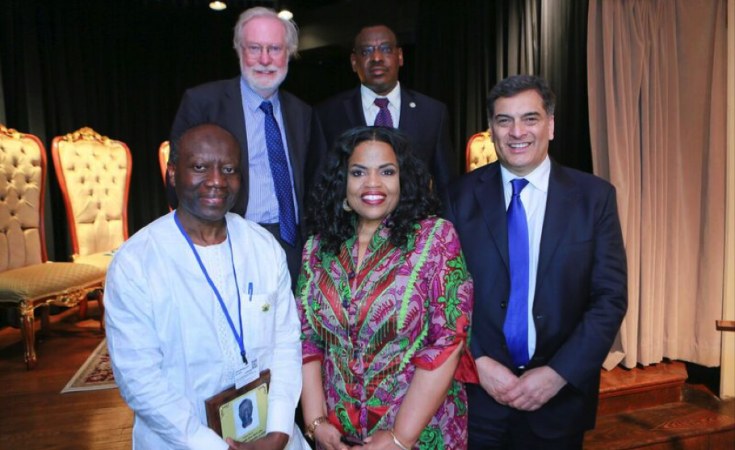How can we make sure that Africa realizes its potential to be a key driver of global growth in what many economists fear is a period of protracted stagnation? That was a question Rosa Whitaker, President and CEO of The Whitaker Group, posed as finance ministers and Central Bankers gathered in Washington for the 2017 IMF/World Bank Spring Meetings at the 2017 Outlook and Opportunities: An Afternoon Reception and Discussion with Finance Ministers from Africa’s Growth Economies.
"Morgan Stanley's Ruchir Sharma argues that we all need to get used to slower growth because of what he calls the three D's – depopulation, deleveraging, and de-globalization," Whitaker said. "Is it naïve to wonder whether Africa, with its young, fast-growing and rapidly urbanizing population, rising disposable incomes and enormous demand for infrastructure, might prove to be an antidote?"
Whitaker raised the question at a forum for African finance ministers co-hosted The Whitaker Group and Invest Africa US, a network of decision-makers at top organizations, fund managers, private investors, family offices, entrepreneurs, and policymakers, with a common interest in Africa.
The forum featured the finance ministers of Ghana, Rwanda, South Africa and Cameroon, with Sir Paul Collier, director of the Centre for the Study of African Economies at Oxford University, in the moderator’s chair. In the audience were portfolio, private equity and direct investors, opinion leaders and representatives of the executive branch and Congress.
The meeting was “particularly timely”, Whitaker said, because “we have a new administration in Washington which is in the midst of drawing up his policies and priorities for engaging with the continent. It is critically important that African voices are fully heard and understood as this process unfolds. It is my firm conviction that Africa cannot have a meaningful foreign policy unless Africa is fully part of it.”
Collier agreed with Whitaker that Africa’s youthful population, in stark contrast to China’s aging one, gave the continent “a huge advantage”, as did urbanization.
“The next two decades will be the core period of Africa’s urbanization,” Collier said. “We talk about growth happening in countries. It actually happens in cities. Cities are where ordinary people become much more productive. You move people from a dispersed rural population to the high connectivity and energy of a city and productivity can leap.”
Africa’s third advantage was that it was “starting poor”. “It is easy to catch up nowadays. You’ve got to work at staying poor because being more productive is pretty straightforward in today’s world.”
Collier added a word of caution. After a “glorious decade” in which African economies had enjoyed the fruits both of debt relief and buoyant commodity prices, the tide was now receding. This would reveal who was naked and who was not, he said, borrowing an image from Warren Buffett – specifically who was “old Africa” and who was “new Africa”.
In keynote remarks, Ghana’s new ice president, His Excellency Dr Mahamudu Bawumia, made a compelling case for his country’s prominent inclusion on the “new” list. Laying out president Nana Akufo-Addo’s strategy for private sector-oriented growth, he declared that Ghana’s government was now “the most business friendly in Africa”.
Dr Bawumia noted that there was “no resistance” to the handover of power after last December’s election and that this was now “a Ghanaian tradition”. When Gambia subsequently appeared to be headed in a different direction, Ghana and its ECOWAS partners stepped in, the Vice President continued. “We did not want to destroy our brand. The West African region is now dominated by democracies.”
During the panel discussion, Ghana’s finance minister, Ken Ofori-Atta, said his government was “in a hurry for macro stability” in order to create the “fiscal space” for spending that was both pro-growth and pro-poor.
“Underneath this whole center-right private-sector drive in the budget is also what we call the preferential option for the poor… (Otherwise) the Gini coefficient continues to be skewed. So there’s a real feeling that should be social justice… That is what motivates the kind of hours the President keeps and the kind of hours we have to keep.”
Rwanda’s finance minister, Ambassador Claver Gatete, said his country had been given “great energy” by its tragic history to experiment with “unconventional approaches” including new types of partnership between government and private sector.
He spoke of the need to develop domestic capital markets to finance business growth and of reducing investor risk and providing the right incentives. He also stressed the importance of regional integration. He spoke with pride of his government’s efforts to build public trust by cutting wasteful ministerial perks and requiring every minister to sign a performance contract with the president.
The finance minister of Cameroon, Alamine Ousmane Mey, said “execution” was key. Thanks to an abundance of young “human capital” and advances in information technology and knowledge, African nations could now “leapfrog” forward using a “new software of public service” based on public trust while moving ‘from a government-centered to a private sector-led economy”.
“We know very well what we need to do,” said South Africa’s finance minister Malusi Gigaba. To tap the “advantages” Collier and other speakers had identified would take strong leadership at both the national and continental level, he said.
“African leaders at the level of the African Union and the regional organizations have already spelled out infrastructure commitments for the continent, identified projects and are working towards realizing investments that will bring those projects to reality. As the leadership of the continent, we need to play our part…in realizing the commitments we have set ourselves.”
“We need to continue working hard towards harnessing our advantages so that we will be able to lead the continent…to a new situation where we will no longer talk of Africa requiring donor funding, aid and so on. We will be able to attract investment, crowd in private investment, and leverage our infrastructure to serve as a driver of demand, expand the middle class and generate revenue from our own people to support our fiscal commitments.”


